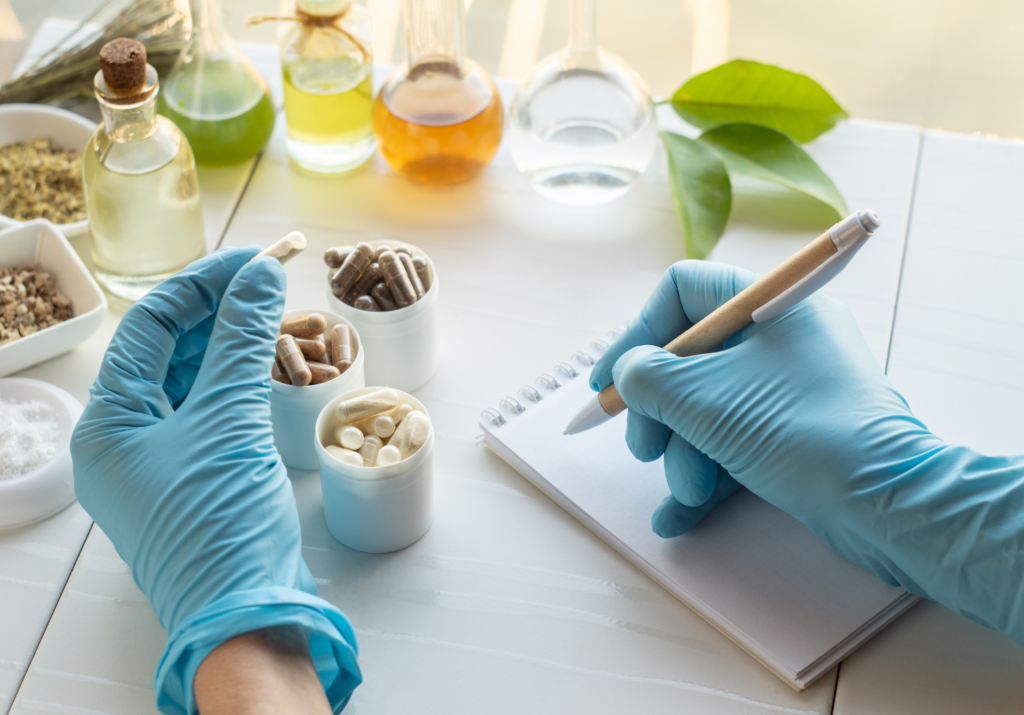Medications/Supplements
Managing fat disorders, such as Lipedema and Dercum’s Disease, often involves a combination of lifestyle changes, medical interventions, and the use of medications and supplements. While there is no definitive cure for these conditions, certain medications and supplements can help manage symptoms, reduce pain, and improve overall quality of life.

Medications for Fat Disorders
Pain Management Medications:
- Non-Steroidal Anti-Inflammatory Drugs (NSAIDs):
- NSAIDs like ibuprofen and naproxen are commonly used to reduce inflammation and alleviate mild to moderate pain. While they can provide temporary relief, they may not be effective for all individuals with fat disorders, particularly for chronic pain.
- Anticonvulsants:
- Medications such as gabapentin and pregabalin are often used to manage neuropathic pain, which can be a significant issue for individuals with fat disorders. These medications help calm nerve activity, reducing pain signals.
- Antidepressants:
- Certain antidepressants, like amitriptyline or duloxetine, are sometimes prescribed for chronic pain management. They can help alter the perception of pain and improve sleep, which is often disrupted by pain in fat disorders.
- Opioids:
- In severe cases, opioids like tramadol may be prescribed to manage intense pain. However, they are used cautiously due to the risk of dependence and side effects.
- Non-Steroidal Anti-Inflammatory Drugs (NSAIDs):
Diuretics:
- While diuretics (water pills) are not commonly recommended for Lipedema due to the condition’s unique fat composition, they might be prescribed in specific cases to help reduce fluid retention. However, caution is needed, as excessive use can lead to electrolyte imbalances.
Hormonal Medications:
- Since fat disorders can be influenced by hormonal changes, some women may find relief with hormone therapy. Progesterone creams or bioidentical hormone replacement therapy (BHRT) are sometimes used to manage hormonal imbalances that may exacerbate symptoms.
Anti-Inflammatory Agents:
- Certain medications, such as corticosteroids and DMARDs (Disease-Modifying Anti-Rheumatic Drugs), may be used to reduce inflammation in specific cases. However, their use is typically limited due to potential side effects.
Liposuction-Related Medications:
- Post-liposuction, patients may be prescribed antibiotics to prevent infection and painkillers to manage post-operative discomfort. Additionally, anti-inflammatory medications can be helpful during recovery.
Supplements for Fat Disorders
Anti-Inflammatory Supplements:
- Omega-3 Fatty Acids:
- Found in fish oil, omega-3 fatty acids have anti-inflammatory properties that can help reduce swelling and pain associated with fat disorders. A daily supplement can support overall cardiovascular health and reduce inflammation in the body.
- Turmeric (Curcumin):
- Curcumin, the active ingredient in turmeric, is a powerful anti-inflammatory and antioxidant. Turmeric supplements can aid in reducing inflammation and easing joint pain.
- Bromelain:
- Extracted from pineapples, bromelain has anti-inflammatory and pain-relieving properties. It may help reduce swelling and bruising, particularly after surgical procedures like liposuction.
- Omega-3 Fatty Acids:
Lymphatic Support Supplements:
- Horse Chestnut Extract:
- Used traditionally for improving blood flow and reducing swelling, horse chestnut extract can support the lymphatic system and alleviate symptoms of fluid retention.
- Butcher’s Broom:
- Known for its potential to reduce inflammation and improve circulation, butcher’s broom may help alleviate the heaviness and discomfort often felt in the legs due to lymphatic congestion.
- Horse Chestnut Extract:
Vitamins and Minerals:
- Vitamin C:
- An antioxidant that supports collagen production, which is vital for skin and tissue health. It can help strengthen blood vessel walls and reduce bruising and swelling.
- Magnesium:
- Magnesium can aid muscle relaxation, reduce cramping, and support overall circulation. It also has a calming effect on the nervous system, potentially reducing pain signals.
- Vitamin D:
- Essential for bone health, immune support, and inflammation control. Vitamin D deficiency is common in individuals with chronic conditions, so supplementation may help improve overall well-being.
- Vitamin C:
Enzymatic Supplements:
- Wobenzym:
- A blend of systemic enzymes that can help reduce inflammation and support the immune system. It is sometimes used to decrease swelling and manage pain in individuals with Lipedema.
- Wobenzym:
Herbal Supplements:
- Gotu Kola:
- Used in traditional medicine to support skin health and improve circulation. Gotu kola supplements may aid in reducing swelling and enhancing the lymphatic system’s function.
- Grape Seed Extract:
- Rich in antioxidants, grape seed extract can help strengthen blood vessels, reduce swelling, and promote healthy circulation.
- Gotu Kola:
Important Considerations When Using Medications and Supplements
Consult with a Healthcare Professional:
- Always consult a healthcare provider before starting any new medication or supplement, especially since fat disorders can present with unique health challenges. A healthcare professional can recommend the right options based on individual symptoms and medical history.
Monitor for Interactions and Side Effects:
- Be aware of potential interactions between medications and supplements. Some supplements can alter the effectiveness of prescription drugs or cause unwanted side effects.
Consistency is Key:
- While some medications may offer immediate relief, supplements often require consistent, long-term use to produce noticeable benefits. Patience and regular monitoring are important to assess their effectiveness.
